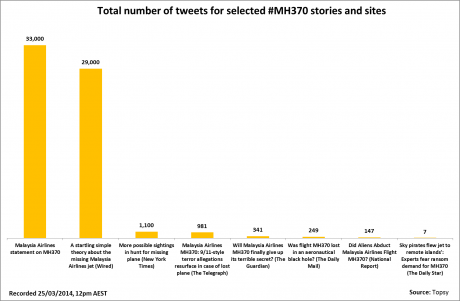Did Twitter cover MH370 better than the mainstream media?

Just some of the absurd headlines that emerged out of the MH370 incident.
Will the mainstream media eventually be replaced by Twitter and the digital crowdsourcing of information? Given Twitter’s track record with misinformation, that's not likely to happen any time soon, but the whole MH370 incident does seem to add some weight to the argument.
Yesterday, the plane was officially declared lost by the Malaysian government, plugging the media storm that had in many cases prioritised rampant speculation over respect for human lives.
The headlines above are just a few examples of actual news stories that emerged in recent weeks. At a time when newsrooms around the world are escalating their attempts to drive traffic by any means possible, this coverage doesn’t paint a pretty picture for the future of news.
The same can’t be said of social media. Twitter seemingly did a better job of distilling out the actual news from the situation than the mainstream media.
As the volume of tweets using the hashtag #MH370 shows, there were four genuine flashpoints during the saga:
Yet over the past fortnight the event generated rolling blogs covering every minute detail, spawned bizarre TV segments, and possibly redefined black hole theory.
In terms of the stories that were shared on Twitter, the network actually ended up giving less priority to conspiracy theories and journalists and more to primary sources.
Indeed, the most tweeted webpages we found weren’t stories at all.
By far, the most tweeted webpage was Malaysia Airlines' blog, a primary source of information.
The second was a story that wasn’t even written by a journalist, but rather Canadian pilot Chris Goodfellow. Wired simply found his widely shared Google post, and with his permission, cleaned it up and posted it on its site.
Interestingly, other pilots replied and contradicted Goodfellow’s theory, largely by commenting for other journalists on news stories. Yet these posts failed to generate as much Twitter traction as Goodfellow’s did.
While it's too early to tell whether social media will fully replace traditional news outlets in providing news to the masses, it should certainly put newsrooms on notice. Still, without Facebook analytics or traffic information from all of the articles it’s difficult to conclude that will happen any time soon.
The MH370 incident shows that social media is capable of filtering the news and distributing web traffic to what matters, which perhaps is a bit of cold comfort to those upset by the rather absurd coverage of some aspects of this tragedy.
READ MORE: Geopolitics lurk amid the MH370 tragedy
Got a question? You can reach the reporter @HarrisonPolites on Twitter or leave a comment below.















